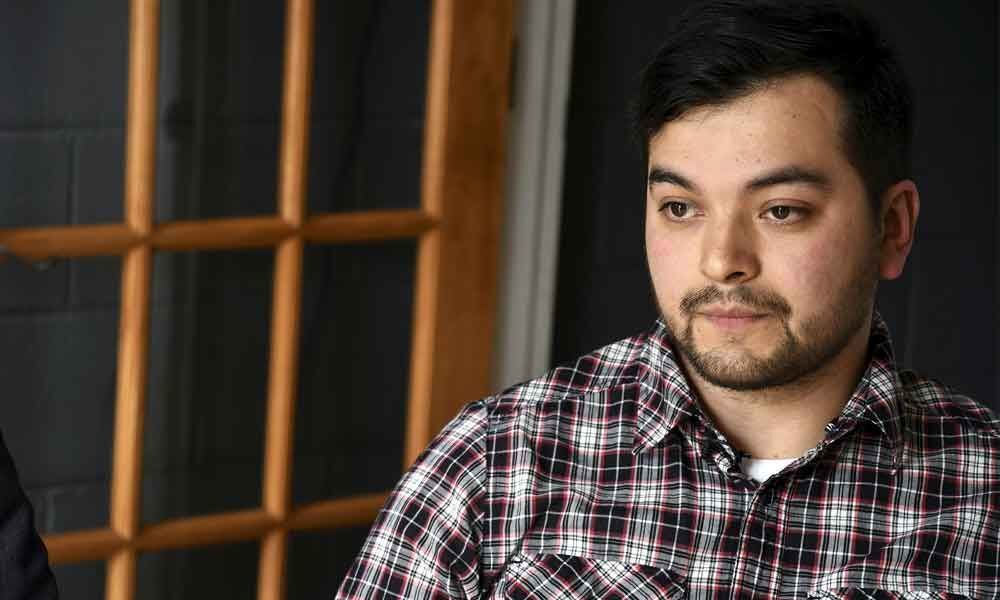Live
- Ullal Woman Files Complaint Against Husband Over Instant Talaq and Abuse
- Analysis: Russia's Nuclear-Capable Missile Marks Shift from Cold War Deterrence Doctrine
- OpenAI Plans In-House Browser "SearchGPT" to Compete with Google Chrome
- MP: Sanatan Hindu Ekta march gets support from BJP & Congress
- Trinamool to hold crucial Working Committee meeting on Monday, organisational reshuffle on agenda
- Who is Breon Peace? The US Attorney Behind the Indictment of Gautam Adani
- Quick commerce workforce expansion to surge by 60 pc in India
- Omar Abdullah to embark on Umrah visit to Saudi Arabia on Nov 24
- Hyderabad Population 2024: 1.6 Crore People and 85 Lakh Vehicles Under HYDRAA's Jurisdiction
- "Wanaparthy District Collector Adarsh Surabhi Orders Precautions to Ensure Safe Mid-Day Meals"
Just In

US immigration authorities blocked two immigrants' applications for citizenship because of their work in Colorado's marijuana industry, their attorneys and Denver officials said, accusing the Trump administration of quietly targeting immigrants seeking jobs in the growing field.
Denver: US immigration authorities blocked two immigrants' applications for citizenship because of their work in Colorado's marijuana industry, their attorneys and Denver officials said, accusing the Trump administration of quietly targeting immigrants seeking jobs in the growing field.
Oswaldo Barrientos said he began working in the marijuana industry in 2014, inspired by the research he had done into medical products after his mother's skin cancer diagnosis. He was brought to the US from El Salvador as an infant and was granted a green card when he was 13. He assumed the citizenship application process would be simple. The 30-year-old is fluent in English and said he has no criminal history, pays taxes and graduated high school.
But during an in-person interview in November, the interviewer became focused on Barrientos' job with a state-licensed company that grows marijuana, he said. Weeks later, he got a letter from US Citizenship and Immigration Services denying him because of his job, his lawyers said. "I was shocked, appalled, sad," Barrientos said. "It was a mixture of emotions. I had no idea I was going to be in this situation." It was not clear Wednesday if people outside Colorado have been denied for the same reason; Barrientos' attorneys said they are not aware of any reported cases.
They suspect people without legal representation may accept a denial quietly, hoping to reapply or give up without approaching a lawyer. Barrientos' attorneys Aaron Elinoff and Bryce Downer, who specialize in immigration law in Colorado, said a second client in Colorado also was denied citizenship for her work in the marijuana industry. She asked not to be named publicly because of a new job in the medical field, they said. Deborah Cannon, a spokeswoman for U.S. Citizenship and Immigration Services, said the agency does not comment on individual cases. She defended denials based on involvement with marijuana, saying the agency must follow federal law that prevents its use or sale.
"Despite state law that may allow medical marijuana use, the Supreme Court has held that Congress' authority under the Commerce Clause empowers it to prohibit drug distribution and possession, even if the prohibited activities are not also illegal under state law," she said. "When adjudicating applicants for citizenship, the agency is required to apply federal law. We appreciate the candor of applicants who provide the requisite documentation illustrating legal purchase and possession under state law. However, as a federal agency, we are legally unable to make special considerations in these cases unless or until federal law is changed." The use and sale of marijuana for adults is broadly permitted in 10 states.
More than 30 states allow a variety of marijuana-based products for medical purposes. Advocates have warned immigrants in Colorado and elsewhere of the damage that state-permitted marijuana use could do to their legal status. A Denver nonprofit that focuses on immigrant and refugee communities paired with the state's largest marijuana trade group for a video campaign in 2017, and the Immigrant Legal Resource Center issued a similar warning in early 2018. Most immigration attorneys would simply advise someone working in the marijuana industry not to apply for citizenship, even with Barrientos' qualifications, Elinoff said. "Frankly, these are the people we want to be citizens," Elinoff said.
"And the U.S. government is telling them no. We don't know how many people have been denied on the same issue." Denver Mayor Michael Hancock met with Barrientos and others this week before calling on U.S. Attorney General William Barr to issue formal guidance on the issue. "Denver understands the need for federal laws and regulations regarding citizenship and immigration, but we are seeing the heartbreaking effects that those federal laws and regulations are having on our residents," Hancock wrote in a letter to Barr. "However, under current federal policy, lawful, permanent residents like the Denver residents I have met with are being denied naturalization and may lose their legal status based on their lawful employment in the cannabis industry." Barrientos said he plans to appeal the denial of his application.
His attorneys are also considering his options in federal court. In the meantime, he is following their advice not to leave the country and risk being barred from re-entering. He plans to keep his job and calls the government's denial of his application "downright wrong." "I'm trying to help people," he said. "We want to work hard to live the American dream. That's all I've ever wanted." Kathleen Foody is a member of AP's marijuana beat team.

© 2024 Hyderabad Media House Limited/The Hans India. All rights reserved. Powered by hocalwire.com







